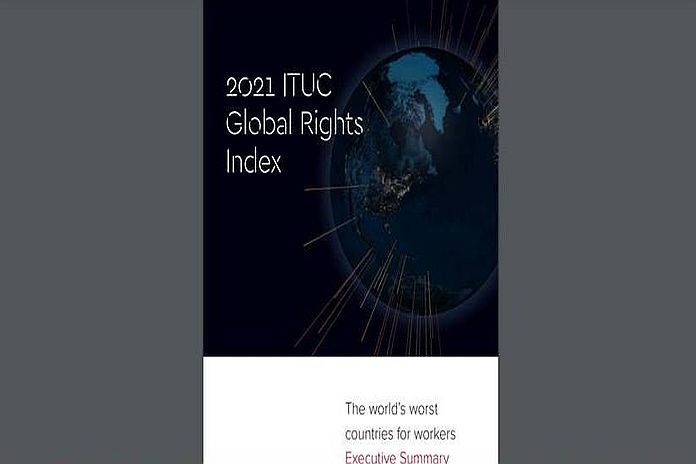By Owen Tudor
Violated, ignored and threatened. These are just some of the words used to describe the woeful treatment of workers’ rights in Commonwealth countries by a new hard-hitting report.
In the past year, working people endured harassment, violence and repression, on top of the pandemic challenges. A new report from the International Trade Union Confederation (ITUC), accompanied by an interactive website, shines a spotlight on the lives of workers in Commonwealth nations, and the systematic abuse of rights by governments and employers.
2021 was a year where strikes and social protests were repressed with violence and disproportionate force. It was a year where workers and trade union activists suffered intimidation, arbitrary arrests, and indiscriminate attacks. It was a year of mass lay-offs, union-busting, and the tearing up of workplace agreements.
The World’s Worst Countries for Workers: How Commonwealth countries performed in the 2021 ITUC Global Rights Index (GRI) catalogues the persistent disregard and repression of workers by Commonwealth states. Five countries in the bloc – Bangladesh, eSwatini, India, Malaysia, and Pakistan – received the worst index rating. Indeed, Bangladesh ranked in the ignominious top ten most terrible countries in the world for working people.
The ITUC’s Global Rights Index (GRI) ranks 149 countries around the world, citing documented violations of labour rights by governments and employers. With the GRI now in its eighth edition, it is deeply concerning that workers’ rights in Commonwealth countries are declining rather than improving. Since 2014, nine countries – Barbados, Belize, Cameroon, Pakistan, Rwanda, Sri Lanka, Tanzania, Trinidad and Tobago, and Uganda have deteriorated, compared to seven that have improved.
A shocking 84 percent of Commonwealth countries were found to be guilty of violating the right to strike. Often, authorities and employers used the summary dismissal or criminal prosecution of workers to create a climate of fear – to deter people from exercising their right to take industrial action.
The report also reveals that Commonwealth countries performed worse than the global average on the right to establish or join a trade union. 87percent of Commonwealth nations denied workers this right, compared to 74 percent globally.
In many countries, migrant workers, domestic workers and temporary workers are routinely excluded from labour protection.
Impeding the registration of trade unions is another repressive tactic commonly used by authorities. Registration is the first step that organisations must take in order to function efficiently and represent members adequately. Unfortunately, Commonwealth countries were guilty of deregistering, dissolving and suspending trade unions, in a concerted effort to stop workers from organising and protecting themselves. In Canada, the province of Alberta introduced stringent and extensive legislation, for unions to form. Similarly, in the Canadian province of Manitoba, substantive labour law amendments were tabled, giving authorities more power to refuse to certify unions, to scrutinise their use of funds and to dissolve them.
Six Commonwealth countries are in the ITUC list of nations in which workers experienced violence – Bangladesh, Belize, India, Malaysia, Nigeria, and South Africa.
Urgent action is needed by the Commonwealth to protect the people who stood on the front line and kept communities functioning during the pandemic. If governments don’t look after workers, then workers can’t look after the economy. The risk to our democracies and economies is too much of a threat to be ignored. With workers’ rights under threat more than ever, it is time for the Commonwealth to hold its members to account for their failings.
Owen Tudor is with the Commonwealth Trade Union Group and is the Deputy General Secretary of International Trade Union Confederation.
Source: The Round Table





